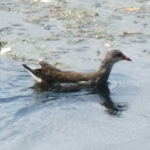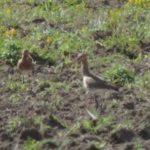Shapovalova I.B. Ornithocomplexes of Artificial Reservoirs in the Central and Southern Russia under the Changes in Anthropogenic and Climatic Impacts // Ecosystems: ecology and dynamics. No 4. 2023. P. 140-176. | Abstract | PDF | Reference
- A chick of the European robin (Erithacus rubecula; photo by I.B.Shapovalova)
- Eurasian siskin (Spinus spinus; photo by I.B.Shapovalova)
- Chicks of the Eurasian spoonbill (Platalea leucorodia; photo by I.B.Shapovalova)
- Black-winged stilt (Himantopus himantopus; photo by I.B.Shapovalova)
- A pair of steppe eagles (Aquila nipalensis) on a nest (photo by I.B.Shapovalova)
- Great white pelican (Pelecanus onocrotalus; photo I.B.Shapovalova)
- A nesting black-winged pratincole (Glareola nordmanni; photo by I.B. Shapovalova)
- Male little bittern (Ixobrychus minutus; photo by I.B.Shapovalova)
- Male ferruginous duck (Aythya nyroca; photo by I.B.Shapovalova)
- Male European honey buzzard (Pernis apivorus; photo by I.B.Shapovalova)
- Female graylag goose with chicks (Anser anser; photo by I.B.Shapovalova)
- Male black-crowned night-heron (Nycticorax nycticorax; photo by I.B.Shapovalova).
In this paper we have analyzed the state of ornithocomplexes in the swamp and wetland ecosystems of regulated sections of small rivers and artificial storage reservoirs in the central and southern regions of Russia. The analysis was carried out according to the developed methodology of transformation of coastal ecosystems in intrazonal conditions. We have characterized floodplain ornithocomplexes in different natural zones of the European part of Russia, such as mixed and broad-leaved forests, forest-steppes, steppes and semi-deserts. Data of seasonal and annual dynamics are provided for the main indicators of transformation, such as species diversity and species abundance. Changes in birds’ species composition and abundance in the swamp and wetland complex were studied in connection with the changing anthropogenic (water management) and climatic impacts.
Keywords: Ivanovo Region, Tula Region, monitoring, dynamics, assessment, impact factor, steppe zone, zone of mixed and broad-leaved forests, forest-steppe zone, floodplain ecosystems, river floodplain, artificial reservoir, anthropogenic impact, intrazonal landscape, aridization, hydrological regime, climate, precipitation, humidity, species composition, population number, population density, species abundance, ornithocomplexes, bird population, rare species, Red Data Book, swamp and wetland complex.
Funding. This work was carried out as part of the fundamental research No. FMWZ-2022-0002 of the Water Problems Institute of the Russian Academy of Sciences planned for 2022-2024 “Studies of Geo-Ecological Processes in Land Hydrological Systems, Formation of Surface and Groundwater Quality, Problems of Water Resources Management and Water Use under Climate Change and Anthropogenic Impact”, state registration No. AAAA-A18-118022090104-8.
DOI: 10.24412/2542-2006-2023-4-140-176
EDN: DQYCCB



























